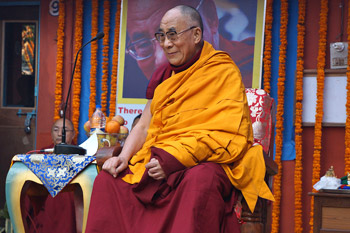
His Holiness the Dalai Lama speaking at the Alice Project Universal Education School in Sarnath, Uttar Pradesh, India, on January 13, 2013. Photo/Jeremy Russell/OHHDL
His Holiness the Dalai Lama Visits the Alice Project School and Inaugurates Conference on Buddhism and Society at Sarnath. Speech of the founder of the school Dr. Valentino Giacomin to His Holiness the Dalai Lama on 12-01-2013 in Sarnath.
Al termine degli insegnamenti a Sarnath Varanasi, Sua Santità il Dalai Lama ha visitato la scuola del Progetto Alice Universal Education School www.aliceproject.org a Sarnath, India, il cui fondatore Valentino Giacomin rivolgendosi a Sua santità ha detto: “Oggi siamo in grado di dimostrare che una combinazione di insegnamento tradizionale
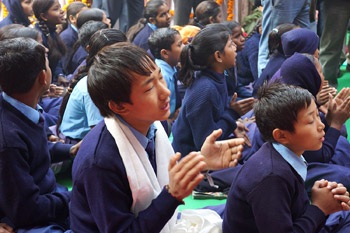
Children from the Alice Project Universal Education School singing the school song for His Holiness the Dalai Lama in Sarnath, Uttar Pradesh, India, on Janaury 13, 2013. Photo/Jeremy Russell/OHHDL
unito all’etica può aiutare gli studenti sia per vivere più felici sia per ottenere migliori prestazioni nei loro studi.” Sorridendo calorosamente, Sua Santità ha risposto “Studenti, insegnanti, personale e sostenitori, vi ringrazio per avermi invitato qui. Vorrei esprimere la mia ammirazione per quello che state facendo. “Gli sviluppi tecnici e scientifici del XX secolo sono stati meravigliosi, ma a volte sembra che l’attuale moderno sistema d’istruzione crei dei problemi, così come il sistema economico moderno ha creato enormi problemi di povertà, non solo a livello individuale, ma a livello di troppi paesi”. Sosteniamo la Scuola del Progetto Alice Universal Education School onlus” (Friuli), per donazioni: IBAN : IT41 N 05728 63740 731570528546 BIC / SWIFT: BPVIIT22731 Banca Popolare di Vicenza – Cividale del Friuli (UD). Valentino Giacomin v_giacomin@hotmail.com, codice fiscale per il 5 per mille è 94103860303.
Sarnath, Uttar Pradesh, India, 14 January 2013 – A short drive from the University, past the Archaeological Site of the Stupa and Monastery ruins, brought His Holiness the Dalai Lama to the Alice Project Universal Education School, Ghurahoopur, Sarnath. The founder of the school, Valentino Giacomin, an Italian, welcomed His Holiness at the gate and escorted him to his seat on the dais. Children and teachers were waiting for him, smiling with excitement. Valentino Giacomin made his report in which he said, “Today, we can show that a combination of
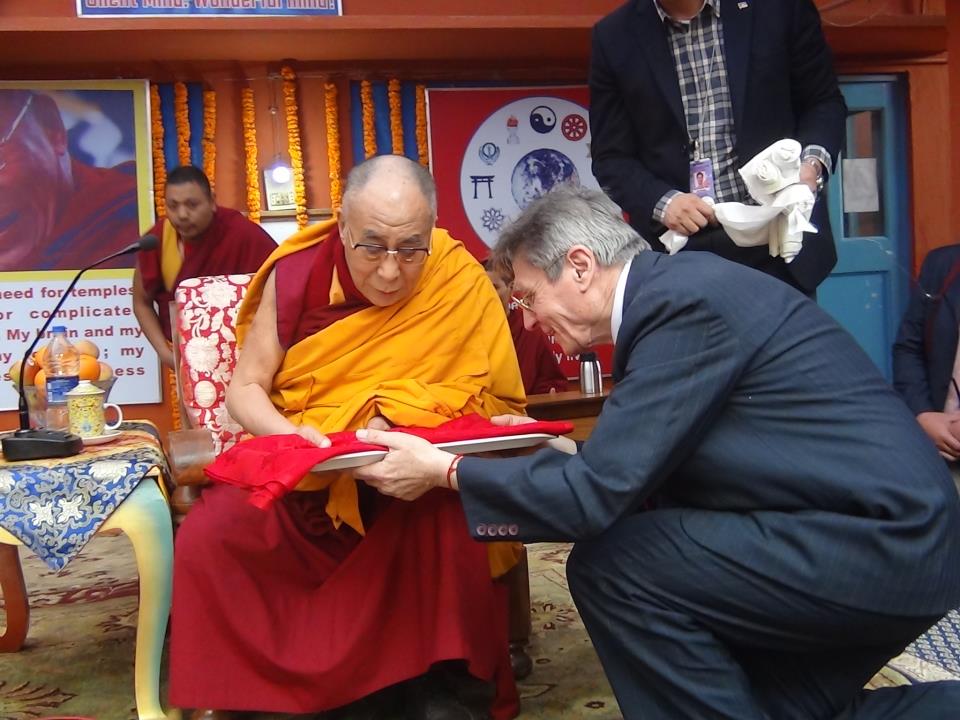
The founder of Alice Project School, Valentino Giacomin welcomes His Holiness the Dalai Lama.
traditional curriculum and ethics can help students both live more happily and achieve high marks in their studies.” The children then sang the school song, swaying joyfully and clapping their hands in rhythm with the tune. They were followed by a group of girls from the Chakma
community, refugees the school supports, who sang a song from their own tradition. Smiling warmly, His Holiness addressed everyone assembled in front of him, “Students, teachers, staff and patrons, thank you for inviting me here. I would like to express my admiration for what you are all doing. “The technical and scientific developments of the twentieth century were wonderful, but sometimes it seems that the existing modern education system creates problems, just as the modern economic system has created huge problems of poverty, not only on the individual level, but on the level of countries too. We can see that education is contributing to the problem. This is serious. “Unfortunately, religion at both an individual and community level has become corrupt. Religion is supposed to provide the inspiration for compassion, giving service to others, but sometimes it is used to exploit and divide people. It becomes a source of conflict. Does this mean religion is wrong? I don’t think so.
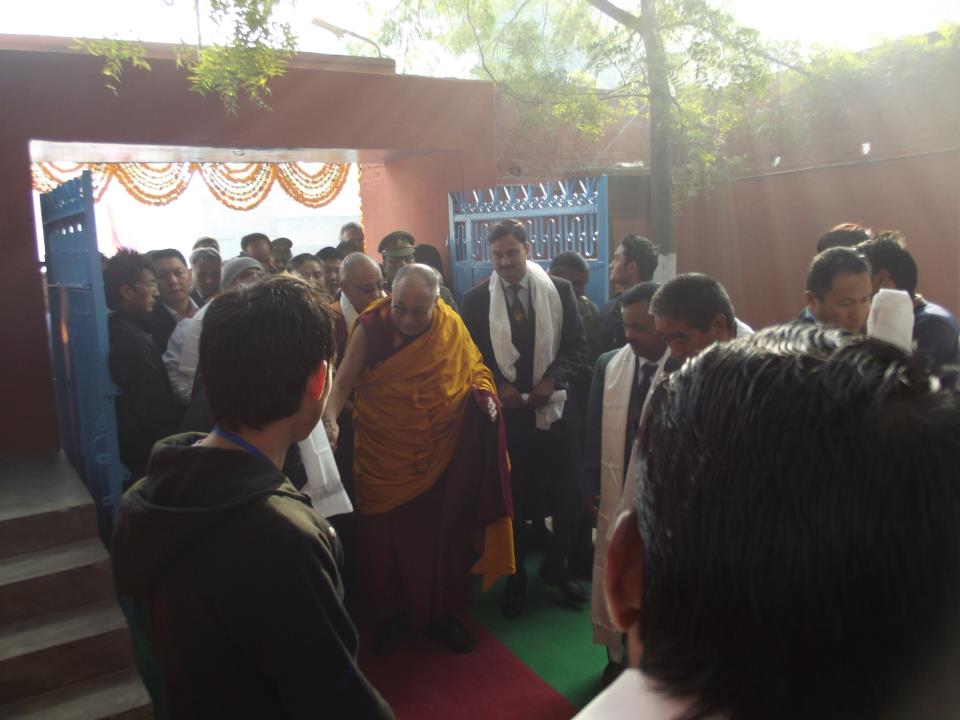
His Holiness the Dalai Lama enters in Alice School in Sarnath
All the major religious traditions teach about the practice of compassion and tolerance, they foster a sense of brotherhood and sisterhood. The trouble is that religious people are not sincere in their practice; they don’t relate their religion to their hearts. This is why we now need a more universal way of promoting moral principles in society. We need a method we can employ everywhere; a secular system of ethics.” He went on to praise India for its secular approach and its secular constitution that provides for respect for all religions and even the right of non-believers to their views. India is the only country where all the world’s major religions, both those developed at home and those that came from abroad, live side by side in harmony. This is an example for the world. He said that for the last two years, people have been giving serious attention to the problem of ethical values in modern education. “This school already emphasises moral principles. The facilities are quite basic, but the education you are giving here is wonderful, wonderful.”
“As human beings we are all the same, whether we believe in religion or not. Our future is related to
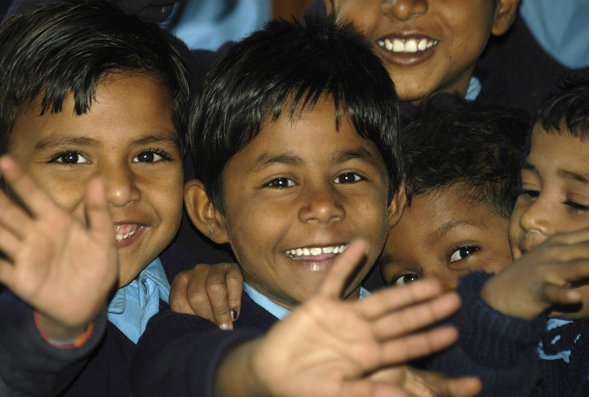
The contagious smile of the childs of Alice School
that of all other beings, so taking care of others is the best way to take care of ourselves. It brings inner strength and self -confidence. That enables you to act more openly, without stress or mistrust. As a result, as individuals, in families and communities, you will be happier.”
“You young Indians, please think about what I have said. Think about how to create a just society with less corruption, a greatly reduced gap between rich and poor. Don’t blame only the politicians for what is wrong; the people themselves must take action. Cherish a vision of a more just society in this country. This is important because India is the world’s biggest democracy. Let it make a greater contribution first in the Asian forum and then in the wider world. “I’d like to say how much I appreciate everyone who has contributed to this great project, teachers, staff and donors. Thank you, please keep it up.”
From the Alice Project, His Holiness drove back to the University to take part in the International Conference on Buddhism and Society.
Vice Chancellor Ngawang Samten opened proceedings,
“Venerable Sangha, scholars from across Asia, colleagues and dear students, welcome to the second International Buddhist Conference at Sarnath.” He described how Siddhartha Gautama began to explore existing spiritualpaths but remained unsatisfied. After attaining enlightenment at Bodhgaya he came to Sarnath and gave his first discourse. He taught about the Four Noble Truths concerning suffering that needs to be overcome. He indicated the path to liberation through his own life, showing that it is essential to recognise reality to eliminate ignorance. He also revealed that material progress is not the answer. We need to transform our state of mind, which is something each individual has to do for themselves. With the advent of Buddhism there was a change in the culture and society in India. This was especially true after the Mauryan Emperor Ashoka transformed himself and then set about transforming society. This led to the golden period of Indian history. In this modern era too, he said, Buddhism is having a remarkable influence on society, as exemplified by the dialogues His Holiness the Dalai Lama has been conducting between Buddhist science and modern science.
Sulak Sivaraksa, the well-known Thai Buddhist social activist gave an extensive keynote address. He began, “It is a great honour to be here and speaking in the presence of His Holiness. Today I want to speak my mind,” and, asserting that Buddhism is not really a religion, he suggested, “Buddhism is a collection of methods to help us wake up from our confusion and find awakening.” Later, he urged Buddhists to speak truth to power by using their traditions of compassion and wisdom to transform the world in a positive way. In his inaugural address, His Holiness said,
“Indeed, it is a great honour to speak to you, following the meaningful contributions of the previous speakers. Sulak Sivaraksa has made many crucial points from his own observations, which we need. When someone falls sick it’s important that his doctor should not shirk the truth. He needs to say, ‘This is the situation, it’s serious and you need to take the following treatment.’ “With so many cars on the roads, our cities have the appearance of prosperity, but at the same time many people are without enough to eat. In advanced societies people are well off, but unhappy. Beset by jealousy, greed and mistrust, they have no friends and become lonely and depressed. When we talk about the welfare of humanity, we need to think of the generations to come. If we go on the way we’re going at present, resources will become scarce and climate change will have far-reaching effects. Religious traditions routinely pray for world peace and we Buddhists pray for the welfare of all sentient beings, but it seems that these sentient beings are on another planet, not here. The conference theme, Buddhism and Society, is very good, but by society we should understand the whole of humanity.”
He said that unless we put our religious teachings into sincere practice, we cannot deal with the problems we face. We need the confidence that comes from compassion, combined with a clear view of reality. Buddhism has the potential to contribute to the world in the present context, but to do that we have to follow the Buddha sincerely with self-discipline as well as compassion. “In Tibet we placed too much emphasis on ritual. Ritual is a part of practice, but not the essential part. Much more important is study. I still consider myself a student. I continue to study the works of the professors of Nalanda University. Please, you too, read what they have written and open your eyes.”
http://www.dalailama.com/news/post/901-his-holiness-the-dalai-lama-visits-the-alice-project-school-and-inaugurates-conference-on-buddhism-and-society-at-sarnath
HIS HOLINESS’ VISIT AT ALICE PROJECT SCHOOL, His Holiness Speech on 13-01-2013 in Alice Project U.E.S.:
Dear students, teachers, staffs of the school, officers and it seems like some sponsors of the school have also come. Today, on this occasion you have come here for a short visit. I am happy on this occasion.
So, firstly, I would like to express my admiration.
Usually, Italian, when they speak English their pronunciation is something different, but your (Mr. Valentino’s) pronunciation is quite good. (Laughing) I appreciate!
When I listened to your report, oh really wonderful, really wonderful. Actually, many (of) my friends, many educationists, many scientists, now we really feel the modern education system, existing modern education system, the lesson of moral ethics (are) very much lacking.
That’s why, obviously, now in 20th century, that century becomes the century of violence.
According to some historians, within that century around 200 of millions of people (have been) killed through violence.
Although, technology and scientists’ research (are) highly developed in that century, (but) this the development of technology and science (is) without education. You can’t do that.
So, the existing moral education, sometimes, even, you see, create more problems. In economy field (there is a) lot of development, but that creates huge gape (between) rich and poor.
Not only in global level, but also in national level. (…) Then (it) looks more educated people (are) more canny. (Laughing) So, education (is) helping to do some wrong things.
So, now this is very-very serious matter (,,,). And then, unfortunately, within…among religions, the community level, individual level, sometimes, you see, often religion itself corrupted.
Religion supposed, you see, (to be) the source of compassion, source of enthusiasm to serve other people, to serve, to help other people. Sometimes religion also used for exploitation; and also religion divides people and sometimes, unfortunately, religion also becoming source of conflict. Now, the question whether religion is something wrong.
Certainly, not. All religions, you see, teach us practice of compassion and forgiveness, tolerance and also its ability to enthusiasm teach us genuine of sense of brother-sister. So, then the answer is: religious people (are) not sincerely (practicing) their tradition, their faith; just religion remains like ritual or artificial, not religion with heart.
So, judging all these facts, (it) becomes clear now we need more universal way to promote the moral principles, because no matter how beautiful one religion (is), it (can) never be universal. So, that’s a problem, this universe faces this problem. So, we have to find some method which can (be adopted) everywhere.
(…) That (is) education, moral principle education about moral ethics based on secular. So, now here (the word) ‘secular’…Some my friends, some Christians, some Muslims, they feel the genuine moral ethics must be based on religion faith, but here, in this country, India, thousand years, at least, I think, three thousand years, (…) secularism means respect (for) all religions and also respect (for) non-believers.
Therefore, ethics, the teaching of ethics based on secularism: this is accepted to every religious circle if they understand properly.
And then, also to non-believers. Also this something relevant… (His Holiness continues saying that the responsible people are not concerned, do not put serious attention about the correct meaning of being secular and they do not work accordingly).
So, now, here see…your school (puts) already emphasis on this principle. So, this school, (is) physically …(Laughing)…not marvelous, but education seems really wonderful.
So, (…) your (…) song, also, mentioned Lord never found in different, religious holy places; only here, in a village, with a little school, at quite poor condition …(laughing)…where the teacher was singing this marvelous song; love your friends and your enemies; love the creatures of this wonderful world, love the earth, love the people beyond the religion…beyond the religion or the image of God. We really need that.
So, whether believe religion or not, we all (are) same human being; 7 billion human being on this planet. Our future, future of each of us (is) related with the 7 billion human beings. So, actually. Taking care about others well being: ultimately (is the) best way taking care (for) one self. So long, keep sense of concerned of other beings; firstly, you get inner (strength), self confidence. So, trough that way, you can act transparently.
As a result, much less stress, much less fear, much less distress. As a result, person becomes much happier, person become happier, friendly and also happier community, one family, 10 families, 100 families. Whole community (will) be happy. Just this morning BBC mentioned about a man…his age 24 something, quite famous, suicide…New York…one really very famous religious person, very young, due to depression … quite famous. This morning BBC …Facebook explained that.
So, such things, high sort of (well-known) person! And he invented some useful things! So, naturally, no problem about economy, money; (he) already has big (amount)…Then why depressed? I mean, why suicide? And also I have heard, last year, about a famous singer, again suicide! (…) Quite often happen. So, this clearly shows that material values and also the education, materialistic education fail bring inner peace (…)
Some my friends, some Tibetans, I think including this person (Monlam Lama) also, you see, they quite suffered after 1959: difficult life, quite fearful, constant threat even in their own life, but they always keep peace of mind. One of my friend, one monk who (was) arrested by Chinese authority in 1959.
Chinese community authority arrested him in 1959, then, till 1980, they kept him in Chinese gulag. So after that (thanks to the) new policy (…) he eventually found the opportunity to come to India and we some kind of (relationship) since we know very well each other. So therefore, one day, I caught him.
Then he mentioned during 18 years in Chinese gulag few cases (where) he really faced some danger. (…) I asked, “What types of danger?” He mentioned: “Danger of losing compassion towards these Chinese!” (…) It’s extremely necessary, important (to) keep compassion towards enemies.
So, perhaps, I think in his heart, I think Lord (is) there. So, recent his age is 94-95. Hi is physical very fit. (…)
Many years ago, I think in early 19th, as a sort of my talk, I mentioned this example. Then some scientists there (were interested on make interview to) few people who (p-(passed) through tremendous sort of dramatic life. These scientists found (they were) very calm, no sign of such trouble…like that… So, these are clear results: keeping more compassionate mind is even (a) benefit for oneself.
Then I think, of course, as I mentioned earlier, all the technology, all our knowledge , all facilities can be positive, no danger. You see this sort of development (is) used for negative things.
So, ultimately moral principle is very-very essential. So, the principle of educating moral ethics, according (secularism). I think this country India. I think really India is the only country where all major world religions live together. I think no other country like that. India, beside (home religion, has allowed to grow) different religions (that are from) anciently Hindu tradition: then Jain tradition, then Buddhist tradition and then, later, Sikhism , Sikh tradition; then from outside (…) Judaism, and Christianity, Islam. All major religious traditions live harmoniously.
Of course, occasionally, in this Country some problems (are) here and there; that’s understandable: some mischief people (are) always there, and sometimes some Indian politicians are quite smart. So, they, sometimes, use religion. So about all India, I think really (it is the) only living example of this planet, (where) religious traditions can live together.
Then, as I mentioned earlier, according (to right understand of meaning of secularism, India) also respect non believers. That is, I think, really wonderful. So, this kind of Indian tradition is not only is ancient tradition, but in 21st century is very much relevant this tradition.
So you young Indians, please, think these points and you should develop vision, firstly, you create more justice society, less corruption, less sort of gape rich and poor.
I think this is everybody sort of responsibility, but we cannot believe on leaders or the politicians. People, ourselves must make efforts. So, you the young generation of this great Country Bharata or Aaryabhumi, so please keep vision. (His Holiness invites the students to create a safe, ecological environment and a just society).
I think, after China (India) (…) is the most populated democratic country. So you have great potential. So make significant contribution, firstly in Asia, then whole world. So, my young Indian friends think these lines and keep some kind of mission and enthusiasm. In order to materialize this mission, education is extremely important. So education combined moral principle and brain development, this must be confirmed. So, see you are here now, so this inner sort of quality.
So I just to say, I just want to say express appreciation to all concerned teachers of donors and leaders, and I really appreciate.
So thank you! Please carry it, continue! And I wish eventually find more open place and then as a usual sort of school some play ground, and some other things, not like here. So may be possible eventually.
(Valentino replies to His Holiness): “We have. We have!”
So, here I think very special, significant (…)
So now finally, as you mentioned our institution (Tibetan University), – not only institution, now university (…) – you already have close contact. So, please, keep close contact and also knowledge or experience (you have) you can share each other and then, as before, when you have certain of project (for) which you are (facing) financially difficulties, then, please, write letter to me. (As) I already said once, (we have) a Trust.
Because of the name Dalai Lama, sacred name Dalai Lama!, some offerings usually happened. So, all this money (is) put in the Trust. I can help (…) from the Trust.
(Then, His Holiness jokes saying the Trust’s funds are limited and we should not ask millions!)
Thank you!
Speech of the founder of the school Dr. Valentino Giacomin to His Holiness the Dalai Lama on 12.01.2013 in Sarnath.
We heartily welcome Your Holiness.
More than 25 years ago, thanks to Ven. Geshe Yeshi Tobden, I had the privilege to meet HH, in Dharamsala, to ask suggestions about my future activity. HH, after checking, told that the outcome of the divination was “excellent” if I would chose the field of education and work in India. I followed the advice with the aim to continue the research for a new education that I and my partner Luigina de Biasi had already started in primary governmental school, in Italy, for ten years.
The target of our research was to find an answer to the question: What to do in order to save the future generations from unhappiness, depression and violence? We found an answer on moral values, ethics and wisdom, which are principles of a spiritual life.
The next question was: How to integrate spirituality into the traditional curriculum?
This was the challenge of our next research: How to find a practical method which combines – in the daily curriculum- science and ethics, knowledge and wisdom.
Alice Project has worked for more than thirty years to find and experiment this method. After more than 30 years of research and practical work, we can today prove that the combination of traditional curriculum and spirituality it is possible. We can confirm that this combination can prevent or reduce the unhappiness of the students, and help to achieve high academic results.
For instance, last year, 100 per cent of our classes X – XII have been promoted with high marks.
Our educational research was not confined in a specific geographical area, but involves about 1200 students in India from three states (Uttar Pradesh, Bihar and Arunachal Pradesh) and students from foreign countries
We are running schools from kindergarten to class XII and Degree College, affiliated to Benares Sampuranand Sanskrit University.
Alice Project can offer meanwhile a large spectrum of didactic material which combines philosophical views, moral education and knowledge of traditional subjects in the scholastic curriculum.
We have about 25 publications that include moral stories books for children, texts books for primary and secondary schools, guide-books for teachers and parents.
We believe that we have everything what is needed to practically implement His Holiness’s vision about education.
We wish now to continue to share our experience with other Educational Institutions as we are already doing.
After the visit of Jetsun Pema la, who have showed interest in our method, as a result, we came in touch with the responsible of Dharamsala TCV School. They have expressed great appreciation for our material and method. They are using part of it in TCV schools in Ladhak .
Also religious authorities from different traditions are showing interest on our research and methodology based on the wisdom of Indian and Tibetan yogi.
Not only in schools, but also in other fields, our material –the moral stories- is used by psychotherapists as tools to heal mental suffering.
A second wish would be that this new education could be adopted, after an appropriate and scientific investigation, by some pilot Buddhist Schools and then shared with other Indian and foreign Educational Institutions.
Therefore humbly we request Your Holiness, to continue to help and endorse this method in the best possible way.
Of course, we have do not have only success, but we face also challenges and difficulties.
We cannot mention all our projects and spiritual work, but we’d like to remark that:
-
On a daily basis, the short Tara’s mantra – that we find also in Hindu religion – and the 21 Tara prayers are recited by a group of our students, since 4 Years, together with a group of 16 nuns, from Kopan Monastery. Also, every day, there is meditation, and a Gayatri puja is done in our Hindu temple, followed – every two weeks – by a fire puja. (I have to mention that the Tara Temple, with all the statues, was donated to our students by a German lady, Liane Pitsos, besides generously supporting the schools for almost eight years. I have to mention that a Nygma Lama was our consultant about mantras, good auspicious symbols and the construction).
-
A five meters Maitreya Statue, in stone, is ready to be installed next to the Tara Temple, for Long life of Your Holiness and peace and particularly for wellbeing .of the holy place of Sarnath and all the world.
-
We would like as well to remember our work for Chakma students. Many of them do not have legal status and no rights. To prevent an anthropological disaster, we decided to help these underprivileged people, by opening schools and building hostels for boys and girls in Arunachal Pradesh, Sarnath and Bodhgaya.
Our future plans:
1. Publishing more books for students and teachers in different languages, included Tibetan.
2. Sending specialized teachers to schools and monasteries in Bhutan. In fact, Alice Project has represented India at the International Conference on “Educating for Gross National Happiness” held in Bhutan three years ago.
3. Starting professional training courses (short, medium and long term) for coming teachers and counselors.
4. Increasing the number of primary school students at Bodhgaya, Sarnath and Arunachal Pradesh schools.
5. Sustaining new Alice Project schools in foreign countries.
All our work has been supported by the precious help and advices of our spiritual director, Monlam Lama, (our savior when we are in trouble) and the cooperation of our school- President Mr Tsewang Tenzin-la, a Tibetan.
On 2006, during the second visit, Your Holiness – jokingly -said: “Now we should compare which one of the students are the more disciplined whether the students of Ven. Ngawang Samten school, in the Tibetan Institute, or the students of Monlam Lama School. I shall see this in the future.”
Well, I would say that this positive and stimulating competition is still going on, and our relationship and friendship with the Director of Tibetan Institute is also very deep and constructive.
We cannot forget the dedicated and professional work of our 50 Indian teachers. Without all their support and enthusiasm there would be no Alice Project.
Also we would like to express our thanks for the tolerance, openness and long sight vision of the Indian Authorities, who have allowed us to help Indian teachers to experience this successful Educational project.
Finally, we have no words to thank Your Holiness for your assistance, inspiration, blessing and your kindness.
Please, Your Holiness, keep all of us in Your heart, forever.
P.S. – The schools do not receive any state aid and survive only thanks to the generosity of the sponsors. Please help with donations to Awakening Special Universal Education Bank Of India – Gaya, Bodhgaya Branch, Bihar, Swift Code : BKIDINBBCOS, FCRA : BKID0004479 A.N. 447920100000010.